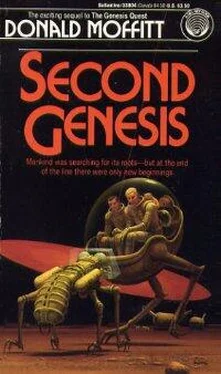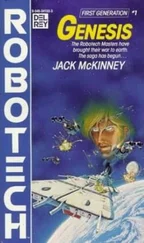Jao stepped forward, holding up an outspread hand, but the creatures veered off to join a work crew at the perimeter of illumination.
“You’d think they’d have stopped,” he said, affronted.
“Different body language,” Shira suggested. “Holding up a hand doesn’t mean the same thing to them.”
It sounded reasonable to Bram, but he saw Heln’s pursed lips and frown of concentration.
They moved into the light. Bram saw Jorv’s space-suited figure ahead, stalking one of the stick-creatures. Jorv approached at a crouch, the lines of his body an exaggerated study in caution. The stick-creature was half turned away, flexing its reedy legs, its sheathed abdomen twitching slightly. It let Jorv get within eight or nine feet, then, abruptly, its legs bunched like springs and it soared over his head and lit down next to a pile of construction materials, where, without preamble, it joined its fellows in putting up one of the polyhedral structures.
Jorv straightened up, every line of his body showing disappointment, and began stalking another one of the creatures.
“We’re not even going to get that close to one,” Jao grumbled.
Every time Bram and his party seemed about to intersect the path of one of the creatures, it veered off and ignored them.
“Just hold on,” Bram said, “and we’ll be in the thick of them.”
“I’m insulted,” Jao said. “Am I invisible, or what?”
Heln said, “They see you … but they don’t see you.”
“Maybe they’re some kind of hive creatures,” Shira put in. “No real intelligence. The intelligence is in that bubble they landed in.”
“They’ve got intelligence,” Bram said. “If intelligence means handling tools and machinery.”
Then, without warning, they were upon one of the creatures. It reared up in their path, the light shining full on it, and for the first time Bram got a good look at what was inside those cagelike helmets.
Its face was the stuff of nightmares—two bulging domes of jelly on either side of a masklike bulb that was split by a vertical cleft. Each of those jellied eyes—if that’s what they were—was the size of a man’s head.
The cleft parted in a hideous vertical smile that hinted at something spiny and complicated within. There was a flicker of movement in front of the ghastly face—and in a moment of startled disbelief, Bram saw why the creatures needed so much room in their helmets.
There was a separate pair of limbs within the helmet!
They grew out of the creature’s face, or the sides of what passed for a neck. They were smaller manipulating limbs—shorter than a man’s arm—and these peculiar beings kept them folded up on the floor of the helmet, like a person resting his elbows on a table.
The creature swiveled its complicated head as if looking for a way of escape, and the facial limbs lifted and swung with it.
A flash of crazy thought went through Bram’s head: It must cramp their style to be deprived of the use of their grasping members whenever they wear space suits! But the creatures’ anatomy gave them no alternative. Limbs projecting through sleeves in a smaller helmet would have immobilized their heads.
Or maybe they simply needed to have their forelimbs available for grooming or self-care. Maybe they would have felt uncomfortable having the limbs enclosed apart from their faces. Bram could sympathize with that—hadn’t he suffered the agony of being unable to scratch an itchy nose while wearing a space suit?
Everything had happened in an instant. Through his radio Bram heard a couple of people gasp—he felt like gasping himself—and then the jelly-eyed horror spun around and galloped away.
“It saw us,” Jao said. “I swear it saw us that time.”
“No,” Heln said. “It saw the effect we were having on its visual field.”
“What’s the difference?”
“Have you ever heard of an animal called a frog?”
“Huh?”
“ Wa, in Chin-pin-yin. The children’s story about the mandarin who turned into one.”
“Oh, yar.”
“It saw motion, not objects. It ate an animal called a fly, but it didn’t see the fly until it moved. If you tried to feed a captive frog on dead flies, it would starve to death.”
“Are you saying that these tomato-eyed beasts are frogs?”
“No,” Heln said patiently. “I’m saying that they have a queer sort of brain wiring that enables them to cooperate as a species but that makes other life forms irrelevant to them—as irrelevant as a fly is to a frog … until the fly moves. We’re no part of their experience—or their instincts—so we don’t exist for them.”
Bram looked around at the teeming campsite. “Aren’t you overstating the case? These aren’t primitive animals. They’ve got space travel. They must process information somehow in those heads of theirs. Can you have intelligence without curiosity?”
Something was bothering him. It was Jao’s description of the creatures as “tomato-eyed.” It was true. The eyes were reminiscent of gigantic green tomatoes. A memory nagged at Bram somewhere below the level of consciousness.
“Maybe.” Heln stood her ground. “And maybe you can have intelligence without empathy. Maybe we’re going to find that these new neighbors of ours lack basic empathy-that it’s literally impossible for them to relate to any life form but their own.”
“That would certainly make it hard to communicate with them,” Ame said with a strained smile.
“To say the least,” Bram said.
“I hope not,” Heln said, shifting some of her technical accoutrements on their carrying straps. “There has to be a way for us to plug ourselves into their sensory wiring. We’ll just have to find it. Let’s hear what Jorv has to say. Maybe he has some ideas about their phylum by now.”
Jorv saw them coming and ambled over to greet them. He seemed preoccupied. “They may be descended from terrestrial insects,” he said without preamble. “Did you notice those wraparound eyes? They probably carry the efficiency of the compound type of eye as far as it can go—their visual acuity may surpass our own. And the muscle attachment—I wish I could make out more through those space suits. They don’t move as if the muscles were operating proper skeletons!”
Bram tried a mild reprimand. “Jorv, you shouldn’t have come out here on your own. We may be running up against a very queer situation.”
“Queer? I’ll say it’s queer. They won’t stand still long enough for me to get a good look at them. Did anybody bring cameras? Ah, Heln—you’d better start taking some pictures.”
“Did you try to talk to them?” Bram asked.
“Talk? They won’t talk. Ame, I think you may have hit on something when you deduced a hookup between sensory input and a visual grid from their radio signals.”
Ame looked excited. “The compound eye means there’s no overall image—just a very large number of separately perceived patches. The visual information jumps from facet to facet, whether the object is moving or the creature’s head is moving, and the sum of the signals is processed somewhere in the brain—”
She broke off. Everybody looked at Heln. “Your frogs,” Jao said.
“What have frogs got to do with it?” Jorv said irritably. “These are insects !”
“Very big ones if that’s true,” Shira murmured. “Insects shouldn’t be able to grow to that size, with exoskeletons as a limiting factor. And they were lungless, weren’t they? They transported oxygen through tracheae. That would limit their size, too.”
“We won’t know till we examine one!” Jorv’s eyes were gleaming. “Do you think you could help me get one back to our camp?”
Читать дальше












